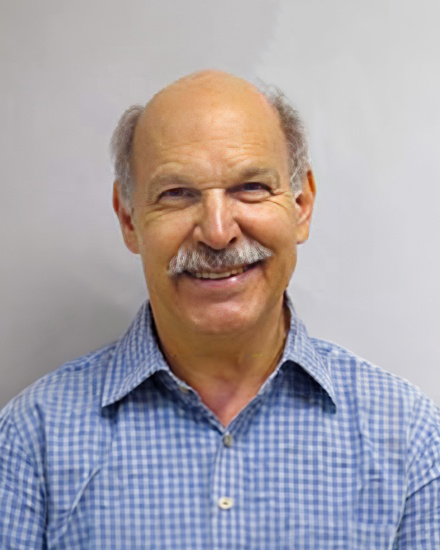
Contact
Office: 305-243-5963Roles
Professor of Physiology and Biophysics
-
Biography
Dr. Muller graduated from the University of Chicago with an SB in Physics and from the Massachussetts Institute of Technology with a PhD in Biology/Physiology in 1971, where he was a National Science Foundation Fellow working with Joel E. Brown. He was a National Institutes of Health Fellow at Harvard Medical School in the Department of Neurobiology with John G. Nicholls, FRS, and in the Department of Cell Biology and Anatomy with Sanford Palay. From 1975 to 1983 he was a Staff Member in the Dept. of Embryology at the Carnegie Institution of Washington (now Carnegie Institution of Science) and an Assoc. Professor, part-time, in the Dept. of Biophysics at the Johns Hopkins University. In 1983 he became Professor of Physiology and Biophysics at the University of Miami School of Medicine. At Miami, in addition to research and teaching, he established the Neuroscience Graduate Program as the first university-wide graduate program and he has chaired or been a member of numerous committees and councils of the University of Miami, including departmental and school councils. On a national and international level, he has directed courses at the Cold Spring Harbor Lab on Long Island and Marine Biological Laboratory (MBL) at Woods Hole, MA, where he was director of the Grass Fellows Program. He was active in the International Brain Research Organization, for which he taught in the Visiting Lectureship Program and was chair of the Symposia and Workshops Committee. He has organized several international meetings, at Miami, at the MBL, and at UCSD. He has served as a member and chair of study sections of the National Institutes of Health and the National Science Foundation, and on editorial boards, including Developmental Neurobiology (formerly Journal of Neurobiology). -
Education & Training
Education
Post Graduate Training
-
Honors & Awards
No result found
-
Teaching Interests
Dr. Muller has taught undergraduate, graduate, medical and post-doctoral students throughout his career at MIT (as teaching assistant to David Baltimore), Harvard University (appointment as Instructor), Carnegie Institution (staff members), Johns Hopkins University (course director, instructor, appointment as Assoc. Prof), and the University of Miami (course director and instructor, appointment as Professor). He has taught and directed annual intensive 3-week laboratory and lecture courses under the auspices of the Cold Spring Harbor Laboratory (course co-director) and the Marine Biological Laboratory (course co-director), and taught similar courses at UNAM (University of Mexico) and with the International Brain Research Organization (IBRO), to name a few, where the students were generally post-doctoral or advanced graduate students and in some cases medical students. IBRO neuroscience courses were in Brazil, Bulgaria, Chile, China, India, Israel, Italy, Kenya, Malaysia, Mexico, Sri Lanka, Thailand, The Philippines, Uganda, and Vietnam. At Miami he directed a laboratory course in neuroscience for advanced undergraduates, courses in neural systems, cellular neuroscience, and developmental neuroscience for graduate students, and has taught cellular physiology, systems physiology, and neuroscience in the legacy courses in the medical curriculum, where he has been course coordinator of the Neuroscience and Behavioral Sciences module. For the NextGenMD curriculum he co-directed the initial Phase 1 Neuroscience module, for which he made a series of videos, and he is currently organizing the Neuroscience and Behavioral Science Phase 3 selective with a neurologist, which will run for 4 weeks twice annually beginning in February, 2023. Dr. Muller was director of an NIH T32 training grant for about 2 decades, for a total of 35 years, which trained graduate students, postdoctoral fellows and medical students in neuroscience and was administered through the Dept. of Physiology and Biophysics. Dr. Muller has also trained numerous high school, undergraduate, graduate, medical and post-doctoral students in his laboratory who have gone on to illustrious careers in medicine, research, teaching, and industry. -
Research Interests
Dr. Muller is a neuroscientist whose research has focused on the functioning, repair and development of the nervous system. Recent work has combined his interest in the visual system with his enduring interest in nerve regeneration and repair. He and his collaborators and students transplanted into living retinas ganglion cell progenetors that integrated into the host circuitry, were driven by light, and extended axons to targets in the brain. Other experiments showed maturation of ganglion cells in vitro depends on interactions with other retinal cells, and that human induced pluripotent stem cells (hIPSCs) can be cultured to develop with the physiology and morphology of retinal ganglion cells. His work on synaptic signalling and integration has rested on the clear link between neuron structure and physiology. To understand structure better, he developed widely used methods for intracellular injection of neuronal tracers--made visible in the light- and electron microscope--into individual neurons studied electrophysiologically. With this approach and laser microsurgery on neuronal branches, he and colleagues identified sites of synaptic contact and demonstrated synaptic modulation by conduction block and reflection of action potentials at branch points of sensory neurons. He and co-workers also devised methods for tracking the movement of living microglial cells to sites of nerve injury and characterized their control by glial cells that release nitric oxide and, through pannexin channels, ATP. Among his early discoveries have been that extracellular currents affect photoreceptor responses to light and, with others, he developed quantitative analyses of reversal potentials and associated conductance changes, including channel closings, underlying synaptic transmission and receptor potentials. He continues to collaborate in studies to restore vision and neuronal function. -
Publications
Disclaimer: The information presented in this section has been consolidated using AI and machine learning technologies. While every effort has been made to ensure accuracy, errors may occur. If you identify any inaccuracies, please use this link to inform our data team. Your feedback is greatly appreciated and helps us improve the quality of our content.

